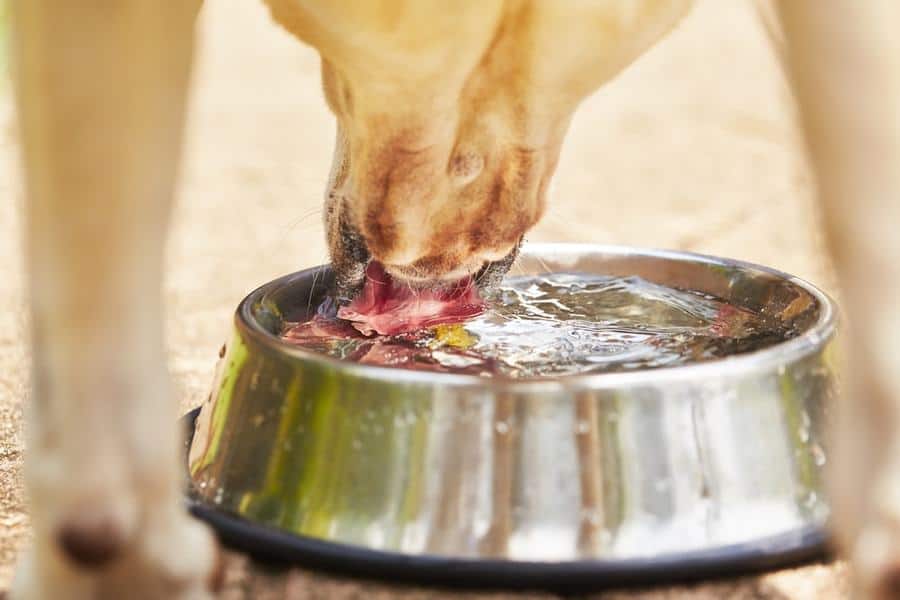“This post contains affiliate links, and I will be compensated if you make a purchase after clicking on my links.”
Is your dog or cat drinking more than normal? Have you noticed your cat suddenly drinking from the tap or your dog drinking out of the toilet? If so, the cause could be a significant underlying disease….
In this article, Laura Du Pre, Veterinary Surgeon and Clinical Director of leading Yorkshire based vets Calder Vets, looks at how to identify if there is a drinking problem, what it could be, and how to treat any potential issues.

What is a normal amount for a dog or cat to drink?
Textbooks define normal water intake as 1-2ml per kilogram of bodyweight per hour (equivalent to approximately 25-50ml/kg/24hrs). For example, a 10kg (22-pound) dog, like a Westie, would be expected to drink approximately 480ml (just under a pint) in 24 hours. There is, of course, some variation between individuals, dependent on the amount of water taken in with their food (wet vs dry food), and water lost through exercise and panting.
Polydipsia (increased drinking) is defined as more than 100ml per kg per day (about 1/2 cup per 2-pounds). Some pets may have noticeably increased drinking, whilst still drinking less than this amount. More than 50ml/kg/24hrs may raise suspicion about polydipsia, whereas over 100ml/kg/24hrs is definitely polydipsia. Polyuria refers to an abnormally high urine production.
Why might my pet be drinking more?
Water balance is tightly controlled by the body through regulation of water intake and water loss in the urine. Lack of water intake or excessive water loss causes the pituitary gland in the brain to release “anti-diuretic hormone” (ADH). ADH signals the kidneys to conserve water and to concentrate the urine. In these circumstances, the thirst centre in the brain is also triggered to stimulate drinking.
Increased drinking can occur either because the concentrating mechanisms of the kidneys fail, the kidneys do not respond to ADH, ADH is not produced or released, or because there is an excessive stimulus to drinking (primary polydipsia).
The most common causes of increased thirst are:
- Kidney (renal) dysfunction
- Liver (hepatic) disease
- Diabetes mellitus (“sugar diabetes”)
- Diabetes insipidous (“water diabetes”)
- Hyperthyroidism (over active thyroid) in cats
- Pyometra, an infection of the uterus (“womb”) in unspayed animals
- Cushing’s disease, an overproduction of natural steroid, cortisol, by the adrenal glands
- Addison’s disease, reduced steroid production by the adrenal glands
- Urinary tract infections
- High calcium levels, sometimes associated with cancer
- Behavioural issues as pets become psychologically obsessed with drinking excessive amounts of water (psychogenic polydipsia)
- Compensatory polydipsia e.g. losses after vomiting or diarrhoea
If you are worried about your pet’s fluid intake, it can be helpful to measure their water intake over a 24 hour period and pass this information on to your vet, along with a fresh urine sample, ideally collected first thing in the morning.
How will the causes of polydipsia be investigated?
Although most cases will be relatively straight forward to diagnose and require minimal testing (such as water intake measurement, a urine sample and a blood test), unfortunately others potentially can be time-consuming, frustrating and costly.
Your vet may recommend a series of tests and investigations, starting with:
- Urinalysis to check how concentrated the urine is and to check for the presence of glucose and signs of infection.
- Your vet may request that you also perform a 24 hour water intake measurement, (if this is practical), to confirm polydipsia and define the degree of polydipsia.
- A complete blood count and serum biochemistry to check their liver, kidneys, blood glucose and thyroid levels. More specific blood tests of hormone function may then need to be performed following on from the initial tests.
After this, the Vets may need to do X-rays and an ultrasound of your pet’s abdomen to look more closely at their liver, kidneys and adrenal glands, in order to reach a diagnosis.
What treatments are available and what is the prognosis?
The treatment for polydipsia in dogs and cats really depends on the underlying cause.
For example;
- in diabetes, your pet would require daily insulin injections.
- in Cushing’s disease, your pet would be given daily medication to control the signs.
- in chronic kidney disease, treatment is aimed at maintaining kidney health and quality of life for as long as possible, by dietary modification, medication and allowing free access to water.
The prognosis ultimately depends on the diagnosis and can vary from very good to very poor. In many conditions, an early diagnosis can influence a more favourable outcome, so increased drinking is an important sign and an indication for the need to investigate.
Please contact your local vets if you have any concerns about your pet’s drinking habits and never restrict your pet’s water intake.












